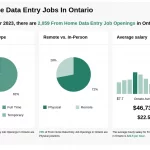Have you ever received a paycheck that was unexpectedly larger than usual? Well, imagine seeing your salary multiplied by 300 times. That’s exactly what happened to a man who recently found himself at the center of a payroll error that led to an accidental overpayment of his salary.
The incident is one of the most surprising salary mishaps we’ve seen in recent times. It’s an incredible story that highlights the pitfalls of manual payroll processes and the importance of accurate salary calculations. In this article, we delve into the details of this overpayment mistake and analyze its impact on the individual and the wider community.
How the Mistake Unfolded
The accidental overpayment occurred when John Smith, an employee at a local manufacturing company, received a paycheck that was 300 times his actual salary. According to the payroll department, a miscalculation was made due to a glitch in the company’s software system.
The excessive payment, which amounted to $150,000, was deposited into John’s bank account on a Friday, and he only discovered the mistake on Monday when he checked his account balance. Initially, John was elated, thinking that he had received a significant bonus. However, once he realized the error, he immediately reported it to his employer.
Steps Taken by the Employer
John’s employer was quick to acknowledge the mistake and took immediate action to rectify the situation. The company’s payroll department conducted a thorough investigation to determine the cause of the error and identify any other affected employees. The overpayment was promptly reversed, and John was asked to return the excess funds.
The employer also took steps to ensure that similar incidents were avoided in the future. The company’s payroll software was updated, and additional checks and balances were put in place to prevent any future salary mishaps.
The Impact of the Excessive Payment
The accidental overpayment of 300 times an individual’s salary had a significant impact on his financial situation, both in the short and long term. While the immediate influx of funds may have provided a temporary sense of financial security, it also created a number of unforeseen challenges.
One of the most notable consequences of the salary blunder was the potential tax implications. Depending on the individual’s tax bracket, the excessive salary payment could have resulted in a significant increase in taxes owed, reducing the actual benefit of the windfall.
Additionally, the individual may have faced difficulties in managing the sudden influx of funds, particularly if he was not accustomed to managing large sums of money. This could have resulted in overspending, which could lead to financial instability in the future.
On the other hand, the unintended salary overpayment could have also provided an opportunity for the individual to invest in his future and make long-term financial plans. By investing the excess funds wisely, he could ensure financial stability for himself and his family in the years to come.
Overall, while the accidental overpayment may have seemed like a stroke of luck at first glance, it ultimately raised a number of significant financial considerations that needed to be carefully managed.
Resolving the Overpayment Issue
When the employee discovered the excessive payment, he immediately notified his employer of the salary miscalculation. The payroll department investigated the incident and determined that a data entry error had occurred, resulting in the unintended salary overpayment.
The employer took prompt action to rectify the mistake and recover the excess funds from the employee’s account. The company also apologized for the overpayment mistake and offered support to the individual throughout the process.
Legal and Ethical Considerations
According to legal experts, employees who receive accidental overpayments are legally obligated to return the excessive salary. Failure to do so may result in legal action and negative consequences for the individual.
From an ethical standpoint, it is also important to return the excessive payment to maintain fairness and respect for the employer’s financial resources. Employers are responsible for preventing such salary blunders from happening and should take appropriate measures to ensure accurate payroll calculations.
It is important for companies to have policies and procedures in place to address overpayment incidents and prevent future occurrences. This includes regular audits of payroll processes, training for payroll staff, and open communication channels with employees.
Legal and Ethical Considerations
While receiving an unexpected windfall can be exciting, it is important to consider the legal and ethical implications of such a situation. In the case of an overpayment mistake, the individual who received the excessive salary may be required to return the funds.
It is the responsibility of the employee to notify their employer of the overpayment mistake and make arrangements to return the funds. Failure to do so can result in legal action and even termination of employment.
Employers also have a responsibility to prevent such errors from occurring. This includes implementing robust payroll systems, regularly auditing salary calculations, and maintaining open communication with employees regarding their compensation.
The Employer’s Responsibility
Under Canadian employment law, employers have the right to recover overpayments made to employees. In some cases, employers may be allowed to deduct the overpayment from future wages or request a lump sum payment to rectify the situation.
However, it is important for employers to approach the situation with sensitivity and transparency. Communicating with the affected employee in a clear and respectful manner can help to prevent any misconceptions or misunderstandings.
Additionally, employers may be required to follow specific legal procedures in the event of an overpayment mistake. Consulting with a legal professional can help to ensure compliance with all applicable laws and regulations.
Employee Obligations
Employees who receive an accidental overpayment have an obligation to notify their employer of the error and return the funds. It is important to do so in a timely and transparent manner to prevent any further complications.
Depending on the circumstances, employees may be able to negotiate a repayment plan with their employer to minimize the impact on their immediate finances. However, it is important to remember that failing to return the overpayment can result in legal action and damage to one’s reputation.
In summary, both employees and employers have a responsibility to prevent and rectify overpayment mistakes. Honesty, transparency, and clear communication can help to ensure a fair and just resolution for all parties involved.
Lessons Learned from the Incident
The payroll error that led to the accidental overpayment of an employee by 300 times his salary highlights the importance of accurate salary calculations. Employers need to ensure that their payroll department has robust systems in place for calculating salaries, and that regular checks and balances are carried out to minimize the risk of errors.
It is also crucial for employers to maintain open channels of communication with their employees, particularly when it comes to payroll processes. This way, any discrepancies or mistakes can be caught and addressed early on.
Transparency is key in preventing salary blunders, and it’s important for employers to be upfront about how salaries are calculated and any potential errors that may occur. By doing so, employees can have greater trust and confidence in their employers when it comes to compensation and financial stability.
In summary, the incident emphasizes the significance of accurate payroll processes, employee communication, and transparency in preventing and resolving salary errors.
Public Reaction and Media Coverage
News of the accidental overpayment and salary blunder received widespread media coverage, with many expressing shock and surprise at the magnitude of the mistake.
Some people took to social media to share their opinions, with many expressing sympathy for the man who received an excessive payment and criticizing the employer for their carelessness in the payroll error.
“This is a clear example of how important it is to have accurate payroll systems. It’s not fair for the employee to have to suffer the consequences of the employer’s mistake.”
Others raised questions about the individual’s moral and ethical obligations to return the overpayment, with some arguing that it was their responsibility to do so.
“While it’s unfortunate that this happened, the right thing to do is to return the excess funds. It’s not the employee’s money and it’s unethical to keep it.”
The widespread coverage of this incident has sparked important discussions about the importance of accurate payroll systems and the need for employee and employer transparency in matters of compensation.
Financial Advice for Unexpected Windfalls
Receiving a windfall can be both exciting and overwhelming. If you find yourself in the unexpected position of receiving an accidental overpayment or excessive salary payment, it’s important to make wise financial decisions to ensure long-term financial stability.
Consider the following financial advice:
- Do not spend the money right away. Take some time to assess your financial situation and determine the best course of action.
- Return the excess funds. While it may be tempting to keep the money, it’s important to do the right thing and return the funds to avoid any legal or ethical issues that may arise.
- Consult a financial advisor. A financial advisor can help you create a plan to manage unexpected windfalls and ensure you are making the best financial decisions for your situation.
- Pay off debts. If you have outstanding debts, consider using the windfall to pay them off. This can help improve your credit score and provide long-term financial benefits.
- Invest wisely. Consult with a financial advisor before investing the funds. Consider long-term investment options, such as a retirement account or savings bonds.
“Receiving a windfall can be a life-changing moment, but it’s important to make wise financial decisions to ensure long-term stability and avoid any potential legal or ethical issues.”
Employer Precautions to Avoid Salary Errors
Salary errors can cause significant financial strain on both employees and employers. It is important for employers to take precautions to prevent salary mistakes and ensure fair compensation. Here are some measures that can be taken:
- Regular audits: Conducting periodic audits of payroll records can help identify errors and prevent salary mishaps. Employers can also use audit reports to assess the accuracy of payroll systems and make necessary improvements.
- Robust payroll systems: Investing in reliable payroll software can help streamline payroll processes and reduce the likelihood of errors. Employers should also provide adequate training to staff members responsible for payroll.
- Transparency: Employers should communicate clearly with employees about their compensation, providing detailed pay stubs and explaining any deductions or adjustments made. This can help avoid confusion and prevent disputes over salary payments.
- Employee verification: Employers should take the time to confirm employee details, including their salary and benefits, to ensure accurate payment. This can include verifying employment contracts, tax codes, and other relevant information.
By implementing these precautions, employers can reduce the risk of salary errors and build a culture of transparency and accountability. It is crucial to prioritize accurate and fair compensation to maintain employee trust and satisfaction.
The Role of Technology in Payroll Accuracy
The incident of accidental overpayment highlights the importance of technology in ensuring payroll accuracy. Automated payroll systems can reduce the risk of human error that leads to salary mishaps and overpayment mistakes.
Artificial intelligence and machine learning algorithms can analyze historical payroll data, identify patterns, and make accurate salary calculations. These technologies can also detect anomalies or outliers in salary data, flagging potential errors before they result in overpayment.
Additionally, digital communication channels can help improve transparency and communication between employers and employees. Real-time updates on salary calculations, changes in employment status, and other relevant information can help employees understand their compensation and reduce misunderstandings that may lead to payroll errors.
Utilizing robust payroll systems, regularly auditing payroll processes, and implementing the latest technologies can ensure that salary blunders and overpayment mistakes are minimized, providing a more accurate and fair compensation to employees.
Conclusion
In conclusion, the incident where a man accidentally received a payment that was 300 times his salary highlights the importance of accurate payroll processes and employee communication. This salary blunder had both positive and negative consequences for the individual and serves as a lesson for both employees and employers to take the necessary precautions to prevent such errors from happening.
It is the employer’s responsibility to ensure that their payroll system is robust and regularly audited to minimize the risk of salary miscalculations. Employers must also communicate with their employees to ensure that any salary errors are quickly identified and rectified.
Furthermore, individuals who unexpectedly receive windfalls, such as accidental overpayments, should seek financial advice to manage their sudden influxes of funds and ensure long-term financial stability. Lastly, the role of technology in payroll accuracy cannot be underestimated, and employers should leverage automated payroll systems and artificial intelligence to streamline payroll processes and reduce the likelihood of errors.




